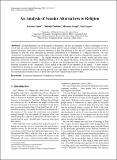An analysis of secular alternatives to religion
Publication Date
2012Author
Daniel Kasomo, Nicholas Ombachi, Joseph Musyoka, Geoffrey Naila Napoo
Metadata
Show full item recordAbstract/
Secular alternatives are not Religions in themselves, but they are presented as ideas or ideologies or lies to which man can commit himself so deepy & unreservedly that they replace religion in him. A person can opt for one of the modern ideologies rather than a religious adherence to give him guidance in life. He will commit himself to such an ideology or with the same dedication & personal commitment as is demanded of a religious believer. The term “ecumenical” in theology today generally refers to the movement which seeks to achieve external unity among the world’s denominationally divined churches. The original meaning of the word (from oikeo: to dwell, inhabit; and oikos: house, household; oikoumene: the whole inhabited earth [Lk. 4: 5]) has lapsed into disuse, as did the later development of the sense of a common basic attitude or into disuse, as did the later development of the sense of a common basic attitude or doctrinal consensus by the “inhabitants” of the surface of the earth or the members of the church. A more modern, comprehensive meaning has since been developed: “ecumenical” means the entirety of the church, which, looking back to its common original traditional and looking forward to its hope, seeks a commonality in doctrine and in the life of faith. The ecumenical movement consists of those Churches which “together seek to know Christ.

